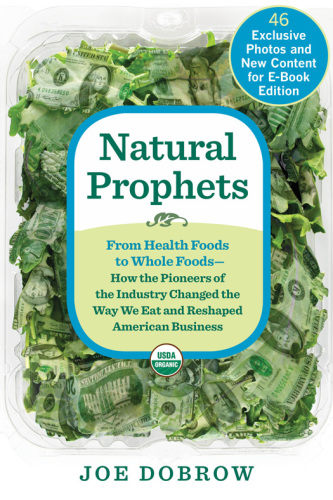
Natural Prophets
From Health Foods to Whole Foods—How the Pioneers of the Industry Changed the Way We Eat and Reshaped American Business
کتاب های مرتبط
- اطلاعات
- نقد و بررسی
- دیدگاه کاربران
نقد و بررسی

February 1, 2014
Some buy strictly organic whereas others have been known to count Twizzlers as a serving of fruit, but we're all increasingly concerned with what we eat and where the food we eat comes from. Executive Dobrow's first book focuses on the business side of the organic and natural foods industry in the United States. While only five percent of food sales are "natural" products, that number still constitutes an enormous market (and one that's growing at an increasing rate). This is the story of how "health" food stores have evolved from the hippie co-ops of the 1960s, with their emphasis on bulk bins and macrobiotics, to the gleaming food emporia of today. VERDICT While primarily focused on companies and their founders, Dobrow succeeds in relating changes in the natural foods industry with concurrent social and dietary movements. Her surprisingly interesting, well-written, and well-researched chronology offers a social and corporate history spotlighting large U.S. natural food stores and manufacturers. Purchase where there is interest.--Susan Hurst, Miami Univ. Libs., Oxford, OH
Copyright 2014 Library Journal, LLC Used with permission.

April 14, 2014
Marketing executive Dobrow charts the remarkable growth of the natural food industry over the past 15-plus years in this enlightening volume. Having worked with companies such as Fresh Fields, Whole Foods, Balducci's, and Sprouts, he offers valuable insight on how consumer demands evolve and the ways in which organic food producers work to meet these changes. Dobrow introduces key moments and players, combining history and sociology with "biographical memoir, and corporate profile." He explores the influence of widespread critiques chemical agriculture such as Rachel Carson's Silent Spring and, more recently, Michael Pollan's The Omnivore's Dilemma. The author also profiles the forerunners behind particularly successful natural food brands including Mo Siegel, who started Celestial Seasonings in Colorado, Bob Moore who turned Bob's Red Mill "into a $120 million business selling a wide variety of wholesome stone-ground grains, flours, and cereals," among others. Their stories prove interesting and their continued success reflects the increasing popularity of the industry as a whole.

January 15, 2014
Marketer, management scholar and journalist Dobrow chronicles how natural and organic foods were transformed from the pursuit of a few idealists to a thriving, multibillion-dollar industry. The author examines the whole food movement from the postwar period, when alarm bells began ringing about the proliferation of chemicals and nuclear waste. He traces its "philosophical but impractical development by idealistic children of the sixties" to the 1980s and '90s, when an ambitious group of opportunists laid the foundation for "its current state as a bubbling crucible of mission-driven entrepreneurial activity." Calling it "one of the great ironic twists in modern history," Dobrow chronicles how the vision of the early counterculture, which embraced environmentalism but rejected the capitalist get-rich-quick ethos, was transformed into the successful business plan of "some of the most successful capitalists of our time." In the process, the author introduces a fascinating cast of characters less well known than the heroes of Silicon Valley but arguably equally influential in transforming the way we live and work. Including the CEOs who put Whole Foods, Stonyfield Farm and Trader Joe's on the map, they have made a "larger contribution to the health and sustainability of the planet and the humans who ride on it than just about anyone else in the modern era." Whole Foods CEO John Mackey, one of the key players, typifies this group of mission-oriented business leaders. He has fostered a highly competitive leadership group with an eye to the bottom line while maintaining the quality of the produce on the shelves of an expanding empire of stores. Mergers, acquisitions, vertical organization with private labels and branding were all important. These days, conventional food manufacturers such as Quaker and Kraft are also marketing health foods, yet with "natural foods only represent[ing] 5 percent of total food sales," there remains much to be done. A lively, informative look at the transformative potential of a mission-driven niche industry.
COPYRIGHT(2014) Kirkus Reviews, ALL RIGHTS RESERVED.

























دیدگاه کاربران